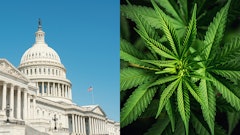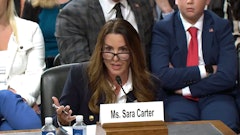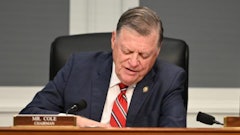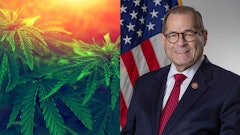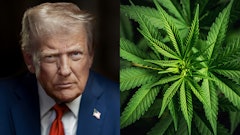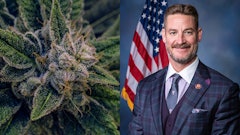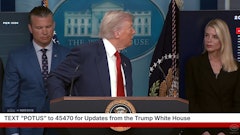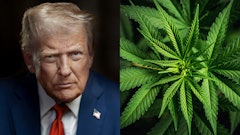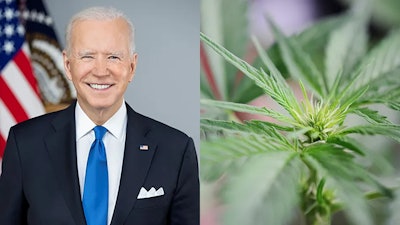
For the first time in more than 35 years, a U.S. president addressed cannabis policy during a State of the Union Address.
But unlike the address in 1988 from President Ronald Reagan, who dubbed cannabis as one of the primary enemies along with cocaine in the “war against drugs,” President Joe Biden reemphasized his commitment to responding to the failures of criminalization during his address in the House chamber last night.
"Keep building public trust, as I’ve been doing by taking executive action on police reform, and calling for it to be the law of the land, directing my Cabinet to review the federal classification of marijuana, and expunging thousands of convictions for mere possession, because no one should be jailed for using or possessing marijuana!" Biden said March 7.
Though it was historic that Biden used the platform to note that cannabis reform was among his priorities, his statements were not new. They aligned with his October 2022 announcement urging federal agencies to review cannabis’s Schedule I classification in the Controlled Substances Act (CSA), and his move to pardon simple possession offenses at the federal level, while calling upon governors to do the same at the state level.
Cannabis was also among the topics he covered during a campaign stop in South Carolina in January, when Biden said: “I [kept] my promises when I said no one—no one should be in prison for merely possessing marijuana or using it, and their records should be expunged. A promise made, and a promise kept.”
RELATED: 5 Cannabis Policy Reform Efforts to Watch in 2024
After Biden’s SOTU speech, cannabis industry stakeholders weighed in on the significance of his cannabis mention.
Matt Darin, CEO of Curaleaf, one of the largest cannabis operators in the U.S., noted the impact of Biden's words and what would happen should rescheduling become a reality.
"It's a significant moment for the country to hear cannabis rescheduling mentioned during President Biden's State of the Union speech. This level of public support of cannabis reform at the federal level is long overdue, and demonstrates a strong point of leverage for cannabis politically,” Darin said in an email statement. “We hope that the DEA will follow President Biden's lead by rescheduling cannabis from Schedule I to Schedule III this year. Rescheduling would contribute to further de-stigmatization of the plant, and by removing the burden of [IRS tax code] 280-E, would allow businesses to place further focus on growth and job creation. For Curaleaf, removal of 280-E could equate to savings of more than $150 million in excess tax contributions. By reducing the tax burden, cannabis businesses of all sizes will be better positioned to thrive and the true potential of this industry realized.”
David Goubert, president & CEO of AYR Wellness, said that the company is "encouraged by President Biden's comments."
"The U.S. has made substantial progress in overcoming the stigma surrounding cannabis, from Reefer Madness to state-led reform, to the precipice of broad federal reform today," Goubert said in an email statement. "We implore the Biden Administration to act on its promises and take the next step in implementing sensible federal cannabis reform."
Bob Groesbeck, co-CEO of Planet 13, said the company was "optimistic" that cannabis rescheduling was noted, and "we are hopeful policy changes are coming sooner than later."
"The President was absolutely right when he said ‘no one should be jailed for simply using or having it on their record,'" Groesbeck said in an email. "The fact that the President once again spoke of directing his Cabinet to review the federal classifications of marijuana is encouraging. Going from a Schedule I drug to a Schedule III will not only be beneficial for Planet 13, but for the entire cannabis industry. It’s time for this administration to do the right thing and bring about reform that is long overdue."
Michael Bronstein, president of the American Trade Association for Cannabis and Hemp (ATACH), said that Biden’s statement “signals that the time for cannabis reform has finally arrived.”
“We applaud President Biden’s remarks and his administration’s support to reverse decades of failed drug policies, which have devastated countless lives,” Bronstein said in an email statement. “Reclassification is in step with today’s science and medical research, public opinion, and goal to get America out of outdated drug laws that have for over decades, hurt marginalized communities.”
However, cannabis advocates from the American Cannabis Collective criticized the comments, calling them “broken campaign promises.”
“It's political malpractice to ignore the voters who got him here. Black and Brown voters that are most affected by the war on drugs resuscitated his failing presidential campaign following fourth and fifth place showings in New Hampshire and Iowa four years ago,” said Don Murphy, federal cannabis lobbyist and co-founder of the American Cannabis Collective. “He promised that he would stop sending people to jail for simple possession, but the arrests continue, and he is keeping the war on drugs alive and well.”
Cat Packer, Director of Drug Markets and Legal Regulation at the Drug Policy Alliance, which organized a press briefing last week to explain why rescheduling cannabis falls short of Biden’s promises for reform and how it would continue to harm those most impacted by the criminalization of the plant, said that Biden's "rhetoric simply doesn't match the reality."
“President Biden was right last night to say that no one should be jailed for marijuana possession or use. But let’s be honest, Biden made two promises on marijuana reform on the 2020 campaign trail – to decriminalize marijuana use and expunge records – and he has failed to deliver either," Packer said. “Biden’s pardons haven’t released anyone from prison or expunged anyone’s records. And until marijuana is descheduled or removed from the Controlled Substances Act entirely, federal criminalization will continue to ruin countless lives, create barriers to jobs, housing, food, and education and disproportionately harm Black and Brown communities."
The Coalition for Cannabis Policy, Education and Regulation (CPEAR) supported Biden’s remarks, and said it is now time for Congress to step in.
“Let’s be clear, it is far past time for Washington’s policymakers to acknowledge states have taken the lead on cannabis policy in the absence of federal action. We applaud President Biden's recent actions, including his pardon proclamation and support for rescheduling cannabis. However, there is still work to be done,” said Andrew Freedman, executive director of CPEAR. “With a majority of Americans living in states with legal adult-use cannabis and widespread support for decriminalization, Congress must address this issue without delay. The time for comprehensive federal cannabis policy, such as the STATES Act, is now, and we stand ready to collaborate with Congress and the Administration to make meaningful progress."
The STATES or Strengthening the Tenth Amendment Through Entrusting States Act aims to give states sovereignty over their own cannabis legalization laws and regulations. It was reintroduced in the House in December 2023, and, like many other cannabis-related bills, has stalled.
Last September, legislation that would provide safe harbor to financial institutions that want to serve state-level cannabis businesses, the Secure and Fair Enforcement and Regulation (SAFER) Act, advanced out of the Senate Banking Committee with bipartisan support, giving hope to many industry stakeholders, but there has been no floor action since. Between 2019 and 2022, the U.S. House passed previous versions of the bill seven times.
Now, the industry awaits the Drug Enforcement Administration’s (DEA) decision on rescheduling cannabis from Schedule I in the CSA to Schedule III, which would finally acknowledge that the plant has medical benefits and that it does not have a high potential for abuse. In August, the Department of Health and Human Services sent its recommendation to reclassify the plant, but the DEA has final authority to reschedule, deschedule, or keep the status quo.
These reform efforts come as 38 states have legalized cannabis for medical purposes, and 24 states have legalized cannabis for adults 21 and older. Moreover, they come at a time when 70% of Americans support adult-use legalization, according to Gallup pollsters.
This support is night and day from the Reagan-era “Just Say No” to drugs campaign of the 1980s, when less than 25% of Americans supported cannabis legalization.
“And now let me turn to three other matters vital to family values and the quality of family life,” Reagan said during his 1988 SOTU address before discussing the state of drug use in the U.S.
“The first is an untold American success story,” he said. “Recently, we released our annual survey of what graduating high school seniors have to say about drugs. Cocaine use is declining, and marijuana use was the lowest since surveying began. We can be proud that our students are just saying no to drugs. But let us remember what this menace requires: commitment from every part of America and every single American, a commitment to a drugfree America. The war against drugs is a war of individual battles, a crusade with many heroes, including America's young people and also someone very special to me. She has helped so many of our young people to say no to drugs. Nancy, much credit belongs to you, and I want to express to you your husband's pride and your country's thanks.”















